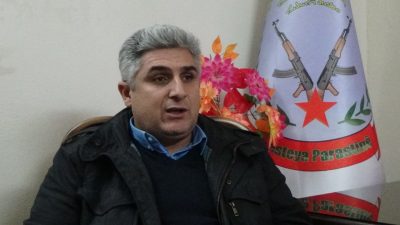Kurdish YPG Fighters Willing to Join Syrian Army? What Prospects of Geneva Peace Talks

Featured image: Rezan Gilo
VISIT MY NEW WEB SITE:
Contact at [email protected].
According to YPG-led Syrian Kurdistan defense chief Rezan Gilo, “(t)here is no problem for our forces to join the Syrian army if a new Syrian constitution is drafted on a federal basis and the rights of all the Syrian components are reserved.”
Joint Syrian Democratic Council president Riad Derar agreed, saying when conflict resolution is achieved, YPG fighters are willing to join the Syrian army – if Damascus agrees to a northern Syria Kurdish federal state, changing its constitution to permit it.
Apparent conditional Kurdish willingness to be part of Syria’s army comes as the latest round of Geneva peace talks begins.
Syria’s delegation delayed its departure. According to its Foreign Ministry, delegates arrived Wednesday afternoon instead of Tuesday, headed by UN envoy Bashar al-Jaafari, a FM statement saying:
“Following intensive contacts, held during the past two days between the Syrian and Russian sides, the Syrian Arab Republic decided to participate in the 8th round of the intra-Syrian dialogue in Geneva” – knowing the futility of past efforts, likely turning out no differently this time.
The so-called unified anti-Syria opposition is led by Saudi-controlled Naser al-Hariri. On Monday, he called for “political transition which achieves the ousting of Assad at the beginning of the transition.”
If opposition delegates stick to this demand as expected, Geneva talks are dead-on-arrival. Previous talks collapsed over this issue, this round likely to go nowhere as well.
Commenting on Hariri’s demand, Russia’s UN envoy in Geneva Alexei Borodavkin said
“(a)ll this is very alarming and will hardly contribute to a constructive dialogue…”
The position of the opposition “is not in line with the real situation” and Security Council resolutions on Syria.
The document agreed on by opposition delegates in Riyadh includes an unacceptable precondition for Assad to go.
“It is unclear how the opposition members plan to hold talks with representatives of the Syrian government if the delegation coming from Riyadh views them almost as criminals with whom it is impossible to talk,” Borodavkin added.
Separately, according to the Jerusalem Post (JP),
“Assad agreed to a demilitarized zone of up to 40 kilometers from the border in the Golan Heights…but only if Israel does not work to remove (him) from power.”
JP claimed Putin relayed the message to Netanyahu. Though reportedly amenable to the deal, his goal remains eliminating Iran and Hezbollah from Syria, said the broadsheet, citing an unnamed source – a topic I addressed in a previous article, a worrisome sign.
Assad is grateful for Iranian and Hezbollah help in combating US-supported terrorists in Syria, significant progress made in defeating the scourge.
If achieved, conflict resolution doesn’t rule out possible revival of the threat, Syria again needing Iranian and Hezbollah help, along with Russian airpower.
It’s unlikely Assad would agree to forego the presence of his valued allies in the country, given the continued threat of aggression ahead – even if conflict resolution is achieved in the months ahead.
UPDATE:
A Syrian government delegation is scheduled to arrive in Geneva on the 29th of November for the Peace Talks hosted by the UN.
“Damascus had threatened to boycott the talks over the demands of the Syrian opposition that Assad step aside as a precondition for its involvement.”
Russia announced it had postponed the Peace Dialogue in Sochi until at least February “over Turkish objections to Russia inviting groups linked to the Kurdish People’s Protection Units (YPG), which it sees as an extension of the Kurdistan Workers’ Party (PKK) in Turkey’s south-east.” (See The Guardian, November 28, 2017)
VISIT MY NEW WEB SITE: stephenlendman.org (Home – Stephen Lendman). Contact at [email protected].
My newest book as editor and contributor is titled “Flashpoint in Ukraine: How the US Drive for Hegemony Risks WW III.”

